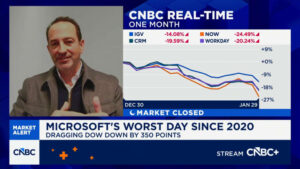Lloyds (LSE: LLOY) shares dived below 46p on Friday, their lowest level since December. I can now pick up two shares in the banking giant for less than a pound with change.
The slide began after the collapse of startup lender Silicon Valley Bank. The US bank had a UK arm, but it was purchased by HSBC for £1. This acquisition meant the collapse of a bank in the UK was avoided, as well as any possible knock-on effects for Lloyds.
That might mean the 14% drop in share price since February is not a true reflection of the company’s value. So if I bought some shares, I could consider it as getting a 14% discount.
And in fact, it’s not the only bank that I could buy into cheaper. UK firms HSBC, Natwest, and Barclays have all lost double-digit percentages off their share prices this month, a strong warning of loss of confidence in the sector.
But if other investors are pessimistic, maybe I can pick up these shares for cheaper than their true price. Warren Buffett’s famous quote comes to mind: “Be greedy when others are fearful, and fearful when others are greedy”.
Let’s assume for a second now is the right time for me to be greedy. Is this the right place to direct my greediness?
Good times for the black horse
Before the SVB debacle blew up the banking sector, Lloyds looked on the rise, with annual profits up in both the last two years.
And with a share price that has been deflated by the current crisis, the annual yield is up to 5.18%.
A 5% return on any investment I make would be pretty nice. Even the best savings accounts don’t return much more than 3% right now, and only a handful of FTSE 100 companies offer a higher yield than that.
In addition, interest rates climbing to over 4% provide a tailwind for the firm to create better margins on products and services, which might offer me even more value if I held this stock.
Am I buying?
The concern for me as an investor is that Lloyds is a dividend stock in a saturated market. With little room for the company to grow, my value from holding shares comes mostly from the dividend payouts.
On the other hand, I could invest in companies with more growth opportunities like those on the smaller-cap FTSE 250 or the US S&P 500. Both indexes have around a 10% historical return, albeit with much more volatility.
All in all, Lloyds does look decent value here and I don’t think the deflated share price is a true reflection of the company’s prospects. Still, the lack of potential growth puts me off opening a position.
This post was originally published on Motley Fool







